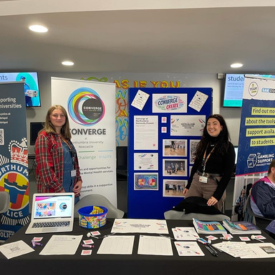-
Study
Study
Interested in studying at Northumbria? With 31,500 students, Northumbria is one of the largest universities in the country, offering courses on either a full-time, part-time or distance learning basis.
Discover more-
Undergraduate
- Undergraduate Study Degree
- Undergraduate Open Day & Events
- Application Guides
- Northumbria University UCAS Exhibitions
- Foundation Years
- Undergraduate Fees & Funding
- School & College Outreach
- Continuing Professional Development
-
Postgraduate
- Postgraduate Study Degree
- Postgraduate Research Degrees
- Postgraduate Open Days and Events
- Postgraduate Fees & Funding
- Flexible Learning
- Thinking about a Masters?
- Continuing Professional Development
- Change Direction
-
Student Life
- The Hub - Student Blog
- Accommodation
- Life in Newcastle
- Support for Students
- Careers
- Information for Parents
- Students' Union
- Northumbria Sport
-
-
International
International
Northumbria’s global footprint touches every continent across the world, through our global partnerships across 17 institutions in 10 countries, to our 277,000 strong alumni community and 150 recruitment partners – we prepare our students for the challenges of tomorrow. Discover more about how to join Northumbria’s global family or our partnerships.
Discover more-
Applying to Northumbria
- European Union
- Our London Campus
- Northumbria Pathway
- International Events
- Entry Requirements
- Agent Network
-
Northumbria Language Centre
- Faculty Requirements
- Acceptable English Requirements
- Pre-Sessional English and Study Skills
- Academic Language Skills Programmes (ALS)
-
International Fees, Funding & Scholarships
- International Undergraduate Fees
- International Undergraduate Funding
- International Masters Fees
- International Masters Funding
- International Postgraduate Research Fees
- International Postgraduate Research Funding
- International Money Matters
-
Life at Northumbria
- International student support
- The Hub - Student Blog
- Careers
-
International Mobility
- Current Northumbria Students
- Incoming Exchange Students
-
-
Business
Business
The world is changing faster than ever before. The future is there to be won by organisations who find ways to turn today's possibilities into tomorrows competitive edge. In a connected world, collaboration can be the key to success.
Discover more -
Research
Research
Northumbria is a research-rich, business-focused, professional university with a global reputation for academic quality. We conduct ground-breaking research that is responsive to the science & technology, health & well being, economic and social and arts & cultural needs for the communities
Discover more -
About Us
-
About Northumbria
- Our Strategy
- Our Staff
- Our Partners
- Student Profiles
- Alumni Profiles
- Leadership & Governance
- Academic Departments
- University Services
- History of Northumbria
- Contact us
- Online Shop
-
-
Alumni
Alumni
Northumbria University is renowned for the calibre of its business-ready graduates. Our alumni network has over 236,000 graduates based in 178 countries worldwide in a range of sectors, our alumni are making a real impact on the world.
Discover more - Work For Us
What will I learn on this module?
This module is based on experiential learning, or ‘learning by doing’ that allows you to learn by hands-on experience and reflecting on that experience. Street Law is a legal education programme which aims to educate members of the public on their legal rights and responsibilities. You will be presented with a problem, scenario or area of law to investigate and using an enquiry based approach you will independently and collaboratively explore, research and discuss the issue. You will then produce an artefact (such as a legal information leaflet which could be used by the public or in house) and/or deliver the findings to others (for example by the preparation and delivery of a lesson in a school or in house). You will construct your own learning goals and research objectives albeit with the needs of your audience (the members of the public benefiting from your work) in mind.
Skills employed will include research, written and oral communication including your ability to organise information in a logical and coherent manner appropriate for your audience and team/group work. You will develop skills in reflective learning preparing you for the Student Law Office at level 6.
How will I learn on this module?
You will be facilitated in your learning by attendance at whole group sessions, supervised studio sessions and small group sessions (Workshops). In addition there will be opportunity for independent reading and research and group tasks. The module is Tutor-guided and facilitated and your learning will take place through a combination of collaborative (team work with a small group of students) and wholly independent, self-directed, learning.
Whole group sessions
There will be a number of whole group sessions in the form of supervised studio sessions in computer / collaborative working spaces to enable you to work in groups or independently on Workshop tasks and produce the materials necessary to deliver the final pieces of work (presentation, information leaflet etc). A tutor will be on hand to assist.
Workshops
The small group workshop exercises will cover a range of activities. Workshops will require you to demonstrate your ability to locate and make effective use of source materials. You will be expected to engage in independent and, at times, directed learning in consolidation of work done in preparation for and during Workshops. Some of the work will be group work and some will be individual work to be shared in the workshop group. You will also have an opportunity to learn how to effectively organise and communicate information orally and in writing. You will also have an opportunity to learn and showcase presentation skills.
Independent and collaborative learning
You will be required to work collaboratively with others to identify and research the needs of the audience for your final pieces of work. You will be guided in your reading and learning by the module and workshop Tutors, but you will be required to identify and find further reading material and research to provide deeper and broader knowledge and understanding.
Assessment of learning
Your learning will be assessed at the end of the Module via a portfolio containing the work you have produced throughout the module together with a reflective account of your learning. The tasks in the Workshops act as preparation for the work produced for the final assessment and you will receive formative feedback in Workshops on those tasks.
How will I be supported academically on this module?
The University will support you in learning and research with an excellent library and teaching facilities; access to on-line databases and resources and appropriate software.
Material will be delivered to you via teaching sessions and through the eLP. The Module will have a dedicated eLP site which includes workshop instruction briefs, PowerPoint slides and links to resources. There is also a dedicated reading list.
There will also be timetabled large group sessions to provide guidance on overarching issues relating to your work. You will be taught by a workshop tutor and tutor will be available for guidance and feedback during the supervised studio sessions.
What will I be expected to read on this module?
All modules at Northumbria include a range of reading materials that students are expected to engage with. The reading list for this module can be found at: http://readinglists.northumbria.ac.uk
(Reading List service online guide for academic staff this containing contact details for the Reading List team – http://library.northumbria.ac.uk/readinglists)
What will I be expected to achieve?
Knowledge & Understanding:
At the end of the module you will be able to :
• Apply and interpret substantive and
procedural law in the wider context of
a hypothetical or actual legal case or
project.
Intellectual / Professional skills & abilities:
You will develop the skills to:
• Effectively organise and communicate information orally and/or in writing and to specialist or non-specialist audiences.
Personal Values Attributes (Global / Cultural awareness, Ethics, Curiosity) (PVA):
• Develop intellectual independence by being able to ask and answer cogent questions about law and legal systems, identify gaps in knowledge and acquire new knowledge.
• Develop independent thinking skills and curiosity.
How will I be assessed?
Formative assessment
Feedback (oral or in writing as appropriate):
• Will be provided in Workshops on the formative tasks that are required for effective workshop participation.
• You will also have the opportunity to receive feedback in Workshops and in the supervised time in studio/workshop sessions on an ongoing basis in relation to the tasks which form part of the final assessment and relating to reflective development.
Summative assessment
Your performance will be assessed with reference to a portfolio which you will submit at the end of the module.
This portfolio will contain key pieces of work you have prepared such as research reports and artefacts (such as lesson plans, Powerpoint materials or leaflets). It will also contain a piece of reflection evidencing your learning and approach to the module.
Pre-requisite(s)
None
Co-requisite(s)
None
Module abstract
The Street Law module will provide you with the opportunity to use and develop your legal knowledge whilst actively engaging with the community. In this module you will work independently and collaboratively on a range of tasks which may include delivering presentations in schools or community organisations or producing information leaflets all with the aim of educating the public on legal rights and responsibilities. A variety of different legal topics will be covered. You will be able to develop practical, legal and key employability skills including research, teamwork and written and oral communication skills.
Throughout this module you will receive support, guidance and feedback from tutors and peers. Your final assessment will be by portfolio containing the work produced throughout the module alongside a reflective account of your learning.
Course info
UCAS Code M101
Credits 20
Level of Study Undergraduate
Mode of Study 3 years full-time or 4 years with a placement (sandwich)/study abroad
Department Northumbria Law School
Location City Campus, Northumbria University
City Newcastle
Start September 2024 or September 2025
All information is accurate at the time of sharing.
Full time Courses are primarily delivered via on-campus face to face learning but could include elements of online learning. Most courses run as planned and as promoted on our website and via our marketing materials, but if there are any substantial changes (as determined by the Competition and Markets Authority) to a course or there is the potential that course may be withdrawn, we will notify all affected applicants as soon as possible with advice and guidance regarding their options. It is also important to be aware that optional modules listed on course pages may be subject to change depending on uptake numbers each year.
Contact time is subject to increase or decrease in line with possible restrictions imposed by the government or the University in the interest of maintaining the health and safety and wellbeing of students, staff, and visitors if this is deemed necessary in future.
Your Learning Experience
Find out about our distinctive approach at
www.northumbria.ac.uk/exp
Admissions Terms and Conditions
northumbria.ac.uk/terms
Fees and Funding
northumbria.ac.uk/fees
Admissions Policy
northumbria.ac.uk/adpolicy
Admissions Complaints Policy
northumbria.ac.uk/complaints














